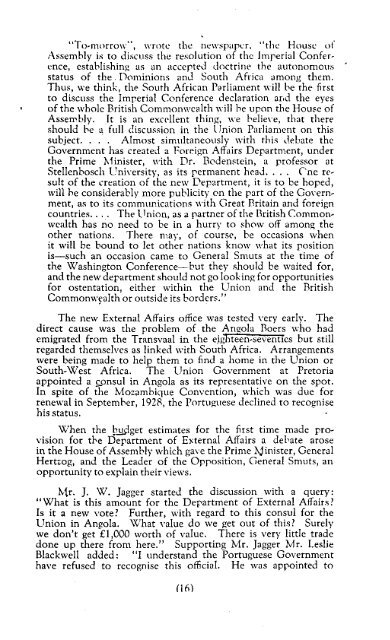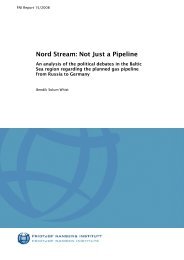SAIIA SOUTH AFRICAN DIPLOMATS ABROAD.pdf
SAIIA SOUTH AFRICAN DIPLOMATS ABROAD.pdf
SAIIA SOUTH AFRICAN DIPLOMATS ABROAD.pdf
You also want an ePaper? Increase the reach of your titles
YUMPU automatically turns print PDFs into web optimized ePapers that Google loves.
"Tomorrow", wrote the newspaper, "the House ot<br />
Assembly is to discuss the resolution of the Imperial Conference,<br />
establishing as an accepted doctrine the autonomous<br />
status of the, Dominions and South Africa among them.<br />
Thus, we think', the South African Parliament will be the first<br />
to discuss the Imperial Conference declaration and the eyes<br />
of the whole British Commonwealth will be upon the House of<br />
Assembly. It is an excellent thing, we believe, that there<br />
should be a full discussion in the Union Parliament on this<br />
subject. . . . Almost simultaneously with this debate the<br />
Government has created a Foreign Affairs Department, under<br />
the Prime Minister, with Dr. Bodenstein, a professor at<br />
Stellenbosch University, as its permanent head. . . . One result<br />
of the creation of the new Department, it is to be hoped,<br />
will be considerably more publicity on the part of the Government,<br />
as to its communications with Great Britain and foreign<br />
countries.. . . The Union, as a partner of the British Commonwealth<br />
has no need to be in a hurry to show off among the<br />
other nations. There may, of course, be occasions when<br />
it will be bound to let other nations know what its position<br />
is—such an occasion came to General Smuts at the time of<br />
the Washington Conference—but they should be waited for,<br />
and the new department should not go looking for opportunities<br />
for ostentation, either within the Union and the British<br />
Commonwealth or outside its borders."<br />
The new External Affairs office was tested very early. The<br />
direct cause was the problem of the Angola Boers who had<br />
emigrated from the Transvaal in the eighteen-seventics but still<br />
regarded themselves as linked with South Africa. Arrangements<br />
were being made to help them to find a home in the Union or<br />
South-West Africa. The Union Government at Pretoria<br />
appointed a consul in Angola as its representative on the spot.<br />
In spite of the Mozambique Convention, which was due for<br />
renewal in September, 1928, the Portuguese declined to recognise<br />
his status.<br />
When the budget estimates for the first time made provision<br />
for the Department of External Affairs a debate arose<br />
in the House of Assembly which gave the Prime Minister, General<br />
Hertiog, and the Leader of the Opposition, General Smuts, an<br />
opportunity to explain their views.<br />
Mr. J. W. Jagger started the discussion with a query:<br />
"What is this amount for the Department of External Affairs?<br />
Is it a new vote. 7 Further, with regard to this consul for the<br />
Union in Angola. W 7 hat value do we get out of this? Surely<br />
we don't get £1,000 worth of value. There is very little trade<br />
done up there from here." Supporting Mr. Jagger Mr. Leslie<br />
Blackwell added: "I understand the Portuguese Government<br />
have refused to recognise this official. He was appointed to<br />
(16)













